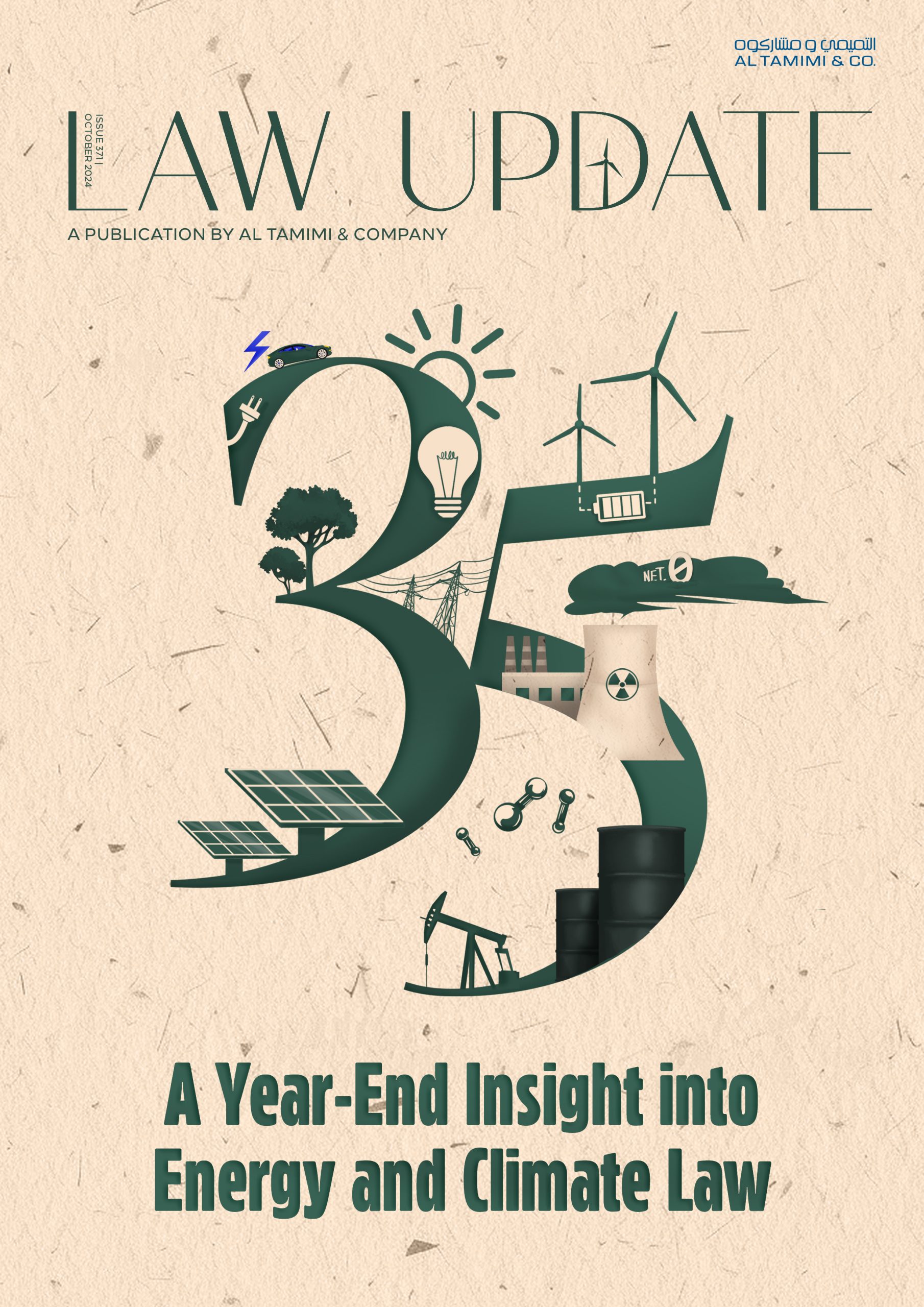- Arbitration
- Banking & Finance
- Capital Markets
- Commercial
- Competition
- Construction & Infrastructure
- Corporate / Mergers & Acquisitions
- Corporate Services
- Corporate Structuring
- Digital & Data
- Dispute Resolution
- Employment & Incentives
- Family Business & Private Wealth
- Innovation, Patents & Industrial Property (3IP)
- Insurance
Find a Lawyer
Book an appointment with us, or search the directory to find the right lawyer for you directly through the app.
Find out more
A Year-End Insight into Energy & Climate Law
This special edition of Law Update, marking Al Tamimi & Company’s 35th anniversary, explores the evolving legal landscape of energy and climate law across the region.
As the Middle East prioritises sustainable growth, this edition examines key developments shaping the future of the sector. From the UAE’s Federal Law No. 11 of 2024 to advancements in green hydrogen, solar financing, and carbon capture technology, we spotlight the innovative strides and challenges defining this critical area.
We also go into Saudi Arabia’s initiatives to integrate carbon capture into its industrial expansion and Egypt’s AFRICARBONEX platform, which underscores the region’s commitment to a sustainable and inclusive future.
Join us as we celebrate 35 years of legal excellence and forward-thinking insights, paving the way for a more sustainable tomorrow.
Read Now
The leading law firm in the Middle East & North Africa region.
A complete spectrum of legal services across jurisdictions in the Middle East & North Africa.
-
Practices
- All Practices
- Banking & Finance
- Capital Markets
- Commercial
- Competition
- Construction & Infrastructure
- Corporate / Mergers & Acquisitions
- Corporate Services
- Corporate Structuring
-
Sectors
-
Country Groups
-
Client Solutions
Today's news and tomorrow's trends from around the region.
17 offices across the Middle East & North Africa.
Our Services
 Back
Back
-
Practices
- All Practices
- Banking & Finance
- Capital Markets
- Commercial
- Competition
- Construction & Infrastructure
- Corporate / Mergers & Acquisitions
- Corporate Services
- Corporate Structuring
- Digital & Data
- Dispute Resolution
- Employment & Incentives
- Family Business & Private Wealth
- Innovation, Patents & Industrial Property (3IP)
- Insurance
- Intellectual Property
- Legislative Drafting
- Private Client Services
- Private Equity
- Private Notary
- Projects
- Real Estate
- Regulatory
- Tax
- Turnaround, Restructuring & Insolvency
- White Collar Crime & Investigations
-
Sectors
-
Country Groups
-
Client Solutions
- Law Firm
- /
- Insights
- /
- Law Update
- /
- October 2014
- /
- Cyber Crime Prevention Law in Qatar
Cyber Crime Prevention Law in Qatar
Ra’ed Alhout
October 2014
This means Qatar retains its rank as second place among 132 developing countries in terms of online connectivity. We are seeing a spike in legitimate digital content services and solutions, not only from the incumbent companies, but also from innovative start-ups, both working through the internet. However with this increase in internet use comes increased cybercrime.
On 16 September 2014 the Qatari government promulgated a cybercrime prevention law (No.14 of 2014) in an effort to increase the tools for combating online and cyber crimes. The new law imposes many sanctions and several penalties for offences committed through the Internet, IT networks, computers and other related crimes. The legislation is aimed at safeguarding the country’s technological infrastructure and strengthening cyber security within Qatar. The law took immediate effect but it will be posted in the Official Gazette to comply with formalities.
During the drafting of the legislation there was considerable criticism surrounded it as many viewed some parts of the legislation as threatening freedom of speech and access to media.
The law contains the following provisions, amongst others:
- The law stipulates a 10 year jail term and a fine of up to QR 200,000 for forging any official e-document, or a three year jail term or a fine of a maximum of QR 100,000 if the document forged is unofficial. Similar punishments await those who impersonate individuals or entities, or are involved in identity theft or steal movable property using the Internet.
- Provisions on so-called “content crimes” that make it illegal to publish “false news”. These terms are not defined, making it unclear what content would land local journalists and social media users in trouble. Therefore news agencies, social media users and journalists must be careful to verify the source of the news before broadcasting it to the public in order to avoid contravening the law.
- A jail term of up to three years and a fine of up to QR 200,000 for unauthorized possession or use of e-card, whether it is an ATM or credit card, or stealing numbers or forging e-cards.
- A jail term of up to three years and a fine of up to 500,000 Qatari riyals for the breach of intellectual property rights by using the internet article 13), be it copyrights, patents, trade secrets, trademarks, trade names, geographical indications and industrial designs, or designs of integrated circuits.
As reported in a study conducted by the 2014 Global Economic Crime Survey by Price Waterhouse Cooper, cybercrimes are the second most common form of economic crime reported in the Middle East. As such businesses operating in the region are at high risk. Despite the concerns raised about the new Cybercrimes law when it was in the drafting stages, it is undeniable that Qatar along with the UAE has taken the lead in addressing the issues related to cybercrime and has implemented penalties and jail terms for those who contravene to the law.
Stay updated
To learn more about our services and get the latest legal insights from across the Middle East and North Africa region, click on the link below.


